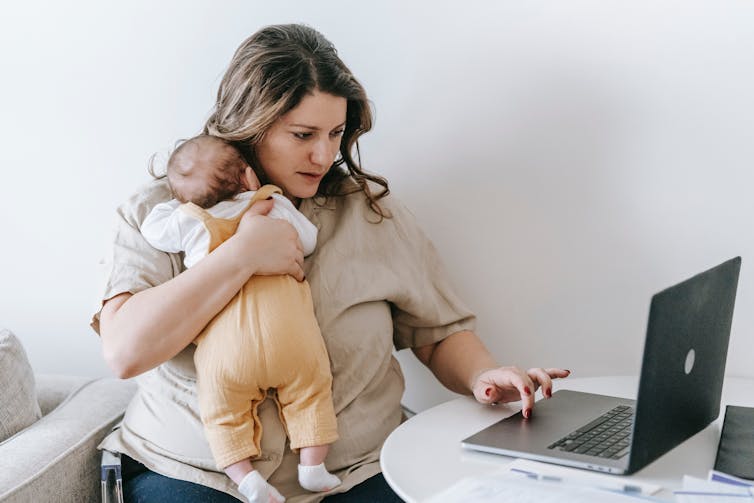We are sold the idea that becoming a new mother is the happiest time of your life. But for many women, the reality doesn’t fit that perfect picture. Yes, they may love their baby very much but the broader impact of having a baby and becoming a mother can feel far more complex.
Research shows that when we look at happiness over our lifetime, the year after having a baby can be one of our lowest points. It’s not about our relationship with our baby but rather the other parts of our lives that have changed so much. Social media hasn’t helped any of this. We are all tempted to just share the best bits, thinking we need to hide our feelings because we think everyone else is so happy. But speaking out helps everyone.
It’s normal to experience some challenging emotions when you become a new parent. You might not immediately bond with your baby, wondering why that flash of love didn’t appear. You might grieve for your old life and identity. You might feel trapped, wanting to escape yet at the same time feeling you can’t leave your baby.
Worries about not being “good enough” for your baby are also common. But honestly, you don’t need to get it right all the time. You are more than enough for your baby. None of these very normal reactions to change mean that you don’t love your baby.
This article is part of Women’s Health Matters, a series about the health and wellbeing of women and girls around the world. From menopause to miscarriage, pleasure to pain the articles in this series will delve into the full spectrum of women’s health issues to provide valuable information, insights and resources for women of all ages.
You may be interested in:
Five old contraception methods that show why the pill was a medical breakthrough
The orgasm gap and why women climax less than men
But knowing when these are normal feelings and when you might need support is important. At least one in five new mothers will experience a mental health issue after birth. Though this is likely an underestimation because many hide these feelings. But hiding them just prevents you from getting the support you need. So here are some signs to look out for:
Postnatal depression: Depression isn’t simply feelings of sadness. In fact, anxiety, about something specific or a general feeling of dread is common. You might lose pleasure in doing things, feel hopeless about the future, or feel very low about yourself.
Anxiety and intrusive thoughts: We all have moments where we imagine ourselves dropping our baby. Sometimes however these thoughts become repetitive, frequent and we can’t make them go away. You might find yourself unable to sleep or waking too early. You might feel restless, overwhelmed in public or feel shaky.

pexels rdne stock project
Postnatal rage: We often don’t talk about rage when it comes to mothers but it’s more common that you think. You might find yourself feeling on edge or irritable and then snap when something small goes wrong. Hormonal fluctuations and a lack of sleep might exacerbate this but more often it’s a reaction to feeling overwhelmed, powerless and unsupported.
Birth or breastfeeding trauma: Many women have some difficult memories of birth but sometimes, even if you are able to talk them over with friends afterwards, these don’t go away. You might find yourself having flashbacks, feel unable to go near the hospital or anything that reminds you of the birth, or feel very angry about your experience, or blame yourself.
Your sleep or appetite might be affected, or you might feel very jumpy or on edge. Sometimes these feelings are linked to physical events during the birth, but often they’re more about how you felt or were treated.
Increasingly similar feelings of trauma or grief are being recognised around infant feeding experiences. If you experienced breastfeeding difficulties or had to stop before you were ready, you might be feeling guilt, anger or loss about that, despite your baby thriving.
Getting support
If you’re feeling overwhelmed by the emotions you are experiencing or find your sleep, energy or appetite is affected, here are some things to try:

Pexels/sarah chai
Talk to friends: Sometimes just sharing how we feel and realising that others feel this way can help us realise we are not alone
Discuss with your health visitor or GP: They can help you understand how you are feeling and discuss different treatments such as counselling and medication
Contact one of the many organisations that can help: The Maternal Mental Health Alliance has a list of contacts. You can talk through difficult infant feeding experiences with a breastfeeding charity. Many doulas (a person who can support you through pregnancy, labour and birth) also offer help to explore how you are feeling about your birth and caring for your baby.
Focus on looking after yourself, too: Your diet, activity levels and time outdoors can all affect how you feel. Do not be afraid to ask others for help or to use sources such as childcare to get some time for you to be able to do this. Explain to them how you feel and what you need.
Creativity is good: The Maternal Journal project holds in-person and online group sessions supporting you to explore how art can help, while also caring for your baby.
Try baby massage: It can help you to slow down and connect with your baby. And it can help increase oxytocin levels in you both, calming your system.
Explore some grounding techniques: These can help you to manage your anxiety. When you feel symptoms of anxiety, look for things in the environment around you. Try and find five things that are blue. Or five things that are soft. Count them and say them out loud.
Most of all remember that none of these feelings are anything to do with how much you love your baby or how well you care for them. Often mothers experiencing mental health difficulties are highly attuned to their baby’s needs because they are so worried about not getting it right. Your baby will be fine, but it’s important that you are too.


